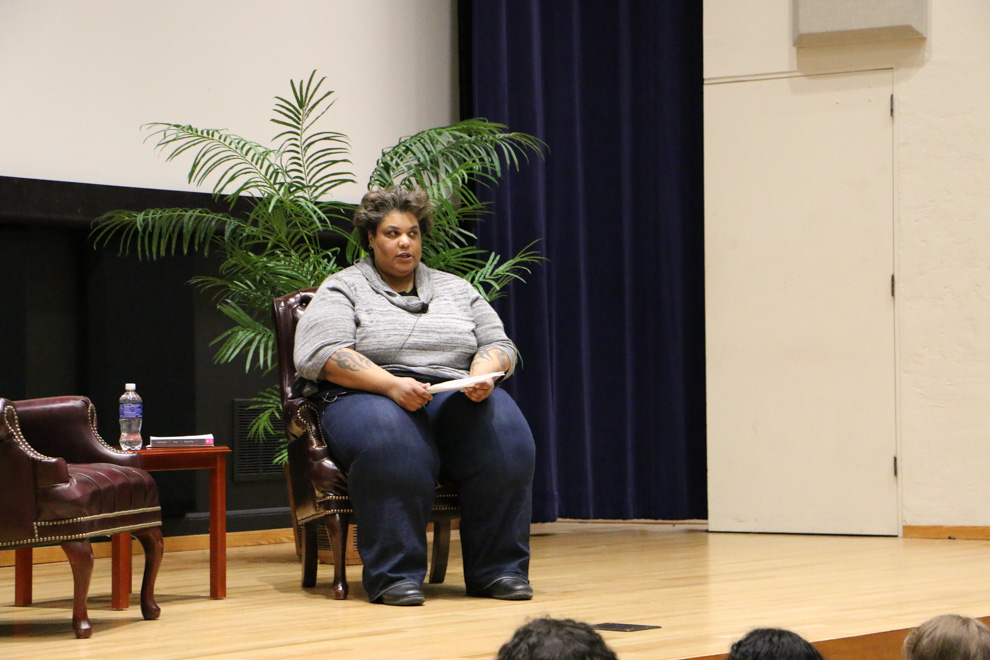Last fall, new student staffers at the Women’s Community Center (WCC) were given copies of Roxane Gay’s book “Bad Feminist” as a welcome to campus. This Wednesday, the WCC and a bevy of campus co-sponsors hosted Gay – the “Bad Feminist” herself – on campus.
Gay, a novelist and essayist well known in feminist circles, spent the afternoon talking with students at a luncheon with the WCC on the first floor of the Fire Truck House, and then spoke at a sold-out Cubberley Auditorium.
Gay drew broad acclaim in 2014 when the “Bad Feminist” became a New York Times bestseller. The book, a collection of Gay’s essays, combines intimate personal stories with academic cultural criticism to explore feminism in a media-saturated 21st century. In her writing, Gay discusses embracing the label of feminism while acknowledging what she calls her failures as a feminist, from listening to misogynistic “thuggish rap” to reading Vogue to liking the color pink.
Faith Kazmi, associate dean for Student Affairs and director of the WCC, reads Gay’s essay as a call for inclusiveness within feminism that does not sacrifice commitment to the movement.
“It was a breath of fresh air – finding someone finally contextualizing and putting into words some of the very common challenges that we regularly see with people struggling with when they try to identify with feminism,” Kazmi said.
When Kazmi saw that Gay was going speak at nearby St. Mary’s College, she reached out to Gay’s agent to book her for a talk at Stanford. Gay’s visit marked the beginning of the WCC’s “Herstory Month” program, which honors the stories and achievements of all who identify on the feminine spectrum.
During her talk at Cubberley Auditorium, Gay read a number of her essays aloud. She began with a piece about her fantasies of her “UPS guy.” With comedic timing, Gay described how the delivery man’s calves flexed, and how she would sometimes come to the door intentionally braless to bend down for the package – “What can brown do for you?” she quipped.
The essay introduced Gay’s penchant for blending comedy with perceptions of race (Gay is of black Haitian descent), sexuality (Gay identifies as queer) and gender.
In another essay, Gay discussed her experiences as a “typical first year professor” teaching at a small Midwestern college, where she was the first black professor many of her students had met.
Today, Gay teaches as an English professor at Purdue University. When she opened up the floor for discussion halfway through her talk, she answered multiple questions from graduate students and faculty who were curious about how she deals with race and gender biases among undergraduate students.
Regarding bias in faculty evaluations, Gay explained how she thought existing evaluation processes could be improved, namely through educating tenure boards on the existence of bias. However, she also expressed some cynicism.
“I think we should get rid of undergraduate evaluations entirely,” she said at one point. When someone asked about addressing both undergraduate biases and biases in general, she responded, “it’s not my job to change minds.”
She repeated that line throughout the talk, including in reference to Donald Trump supporters, whom she accused of perverting their “understandable” frustration into racism that they use to “punch down.”
Aurea Bolaños, a senior at UC Merced, drove from her campus to hear Gay talk. Bolaños, who spent the summer as an intern in the president’s office at the National Organization for Women (N.O.W), asked Gay about “intersectionality” in the feminist movement.
“When I was working at N.O.W., I was the only Latina there,” she said. “My question is … how do I go back and change that culture?”
Gay spoke briefly about diversity hiring practices but again expressed cynicism.
“N.O.W. has been like this for 50 years,” she said. “They know how to change; they do not want to change.”
As audience members lined up for autographs afterward, Marta Hanson, assistant dean for Student Affairs and associate director of the WCC, invited students to go to the Fire Truck House for a “debrief talk.” During the debrief, a circle of about 25 students discussed their impressions of the speech and their own experiences with feminism.
Gay had to leave to catch a flight, but she likely would have been heartened by the meeting.
“I think undergraduates … need to give a damn, and recognize where they are,” she told The Daily. “I think if more undergraduates did that, they would enjoy college a lot more.”
Gay seemed to enjoy her time at Stanford. Besides complimenting the campus and its amenities, she expressed her appreciation for being able to travel to different universities.
“It’s exciting to travel across the country and see what’s exciting and what’s different,” she said. “And to be able to spread what I feel is the good word about social justice and feminism and equality.”
Contact Jack Herrera at [email protected].
A previous version of this article incorrectly stated Faith Kazmi and Marta Hanson’s titles. The Daily regrets this error.
